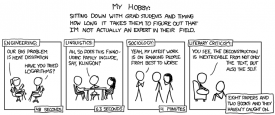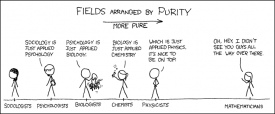When I was fourteen, I read
Joy in the Morning by Betty Smith (of
A Tree Grows in Brooklyn fame). I read it in a Reader's Digest collection. I feel confident that it has no intentional levels of symbolism or literary or biblical allusion woven into it (of course I could be mistaken). I am certain that Betty Smith just wanted to tell a good story to entertain, and perhaps cause a few tears to trickle down some sentimental cheeks. My use of the word
just makes my statement sound pejorative, as if I am dismissing such authors and readers and works, but this is not my intent. There is nothing wrong with pure entertainment from a great story, well told, free of all philosophical and theological entanglements.
Aristotle said, "The unexamined life is not worth living." Psychiatrist David Viscott retorts, "The unlived life is not worth examining."
One Summer, when I was 13 and bored, I went into a drugstore, and found in the paperback bookracks a copy of
Out of a Silent Planet by C.S. Lewis. I had never been brought to church or Sunday school even once, so I had no real ideas about the Bible or religion. I enjoyed the story, the fantasy. I realized on some level that the author was implying something about God towards the end of the book. I was very proud of myself for this insight. I sincerely wondered if others were so clever as to read the book and think about such things.
Those were the halcyon days when I could just enjoy a book or even a comic book as a great story. I was not searching for meanings and symbols.
It seems very obvious to me that certain authors have consciously attempted to weave symbolism and allusion into their works; authors like Herman Melville or Yann Martel, to mention someone from the past and someone from the present.
Milan Kundera, for another, is obviously trying to do something subtle, and speaks at great length, openly, about such subtleties in his essays,
The Art of the Novel.
Wallace Stevens is another one who is being subtle, and who discusses it in his essays,
The Necessary Angel.
I think it would be possible to make a list of all authors who pratice symbolism, subtlety and innuendo, and a second list of authors who are straight storytellers and entertainers.
Another term I have seen for such subtle writing is
multivalent, something with two or more levels of meaning, as opposed to a very explicit univalent text. Of course, we may also see the same root word in ambi
valent , possibly, the same root in the word
value.
Kant speaks of the
antinomies, opposing concusions which different people may arrive at regarding the same issue, and yet it is utterly impossible to prove the truth of one and refute the other side of the argument. What is one to do who lives in an antinimous reality, which ever offers some solution, just out of reach, yet never arrives at a conclusion with finality?
Writers, for the most part, are rather stuck with writing about what they know, whether it is cowboys and indians, or alcoholics and prostitutes, or preachers and parishes.
Faulkner stated that all he knew was the South, and life was too short for him to learn something other than the South and also write. Yet Faulkner wanted to take all that is humanity, and inscribe it on the head of a pin; capture it in a cameo.
Have a look at these essay I wrote in college, in the 1960's, on the matter of analysis and deconstruction:
http://toosmallforsupernova.org/method.htm
http://toosmallforsupernova.org/prolegommena.htm
http://toosmallforsupernova.org/historyofphilosophy.htm
Vergil tells us that there are two gates which lead out from Hades; the gate of true dreams, and the gate of false dreams. We are explicitly told that Aeneas leaves Hades through the gate of
false dreams. Why? What did Vergil have in mind when he wrote that scene. More importantly, what did Vergil want the
reader to have in mind when reading this.
It is my theory that present day literary analysis, metonymy, allegory,
metaphor, at. al, has its roots in the early Church's attempts at
exegisis, at least in part. There are some very good reasons why the early Christian church was highly motivated to do a deconstruction of the Old Testament, and demonstrate the multivalent latent implications that the virgin birth, and the cross, and the ressurection were concealed symbolically and metaphorically throughout the Old Testament. As centuries passed, the process reversed and it was artists who were, not deconstruction, but constructing their own "apples of gold in fittings of silver."
It was Augustine who said : "The New Testament is in the Old Testament
concealed, and the Old Testament is in the New Testament revealed."
Jesus, who spoke in parables, confides to his disciples that there is an outer carnal meaning for the masses and an inner, concealed, spiritual meaning
for the elite.
Jesus even invites us to join in the "easter egg hunt" of literary
analysis when he says, "Search the scriptures for therein shall ye find
eternal life."
Consider the example of Jesus profound literary insight, when he points out that, in the Old Testament, God DID NOT say "I WAS the God of Abraham and Isaac and Jacob" (which would imply that those three patriarchs were dead at the time) but rather "I AM the God of Abraham and Isaac and Jacob" (implying that the three patriarch live and worship even through they no longer walk the earth in the flesh).
Of course, someone shall surely object and say that what Jesus did was not literary analysis but rather, grammatical analysis, or possibly just plain common sense.
So, we must attempt to define what we mean by "literary analysis."
I was so enormously impressed by Nabokov's essay on Kafka's "Metamorphosis" where he says (paraphrasing from my poor old memory) "I shall now share with you something for which you shall be grateful to me for the rest of your lives. All beetles have wings, (concealed under their carapace). The great tragedy of "Metamorphosis" is that the protagonist NEVER found his wings. And there are many of us in life who never find their wings." Nabokov and Jesus are so clever, each in their own way of course.
Now, as far as we know from the scriptures, Jesus never wrote anything EXCEPT for one time, when he wrote in the sand with his finger, after he told the crowd that "he who is without sin" may cast the first stone at the adultress. We read that one by one, slowly, each person walked away until there was no one left but Jesus and the condemned woman. Now, early Church theologians, being literary analysts of the calibre of Nabokov, speculated about WHAT Jesus might have been writing in the sand, as people slowly left, one by one. They speculated that Jesus was writing obscure things in the sand, known ONLY to each individual in the crowd, which would convict them in their hearts of the fact they each was INDEED with sin, and not qualified to caste the first stone. Now, in these modern times, if someone were to write "Holiday Inn, Rm. 512, July 2" and YOU remembered that this is the exact date and room where you committed adultry.... well you get my point.
When Jesus meets Nathaniel (my memory may be faulty on this), Jesus exclaims, "Behold and Israelite in whom there is no guile." Nathaniel is perplexed and says "How is it that you know me?" Jesus answers, "I saw you beneath the fig tree." Now, we shall never know what that meant to Nathaniel, but he was utterly THUNDERSTRUCK and exclaimed something to the effect that surely Jesus must be the Messiah, the promised one. Perhaps Nathaniel was sorely tempted to steal a fig, but wrestled with the temptation and overcame it. Perhaps he was under the fig tree with a woman, and refrained from doing something improper. Who knows what Nathaniel did, but he sure as heck remembers that old fig tree.
The Proverbs of King Solomon mention "the wisdom of the wise and their DARK sayings." Now, for me, a DARK saying is one which is MULTI-VALENT and implicit, and lends itself or rather invites us, to literary interpretation and analysis. The proverb, "A word of wisdom, fitly spoken is like unto an apple of gold in silver filagree (fittings)" has been taken as a paradigmatic metaphor for how we analyze literature which, on the surface, appears to be one thing, but beneath the surface, is altogether something else.
If the reader cares to dig more deeply into such matters, then see:
the Kundera thread;
http://thebookforum.com/forums/showthread.php?t=7493
the Baudelaire thread;
http://thebookforum.com/forums/showthread.php?t=7489
the Leo Strauss thread;
http://thebookforum.com/forums/showthread.php?t=7672
the Wallace Stevens,
Necessary Angel thread;
http://thebookforum.com/forums/showthread.php?t=7491
Gems from Gravity's Rainbow
http://thebookforum.com/forums/showthread.php?t=7594





 :lol:
:lol: